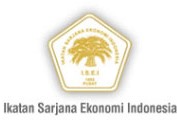Determinants of Regional Household Final Consumption Expenditure in Indonesia
(1) Universitas Airlangga
(2) Universitas Airlangga
Abstract
The Indonesian economy, both at the national and regional levels, tended to experience a slowdown during 2010-2019. From the demand side, household final consumption expenditure (HFCE) is the primary cause of the slowdown. Therefore, various efforts are needed to maintain and improve HFCE. One of these efforts is to keep the stability of the macroeconomic factors that influence it. This research aims to reveal the determinants of regional HFCE in Indonesia. The determinants of HFCE were investigated using a dynamic panel data regression model with the first-difference Generalized Method of Moments (FD-GMM) approach and applied to data from 33 provinces during 2010-2019. The application of FD-GMM provides valid and consistent estimates. The results of the parameter significance test provide evidence that the lagged real HFCE, real gross regional domestic product (GRDP), and government spending have a significant positive impact on real HFCE. Meanwhile, both the inflation and unemployment rates had significantly negatively impacted. Thus, the role of policymakers in maintaining the stability of the five macroeconomic factors is necessary so that HFCE increases and the economy can grow even higher.
Keywords
Full Text:
PDFReferences
Akekere, J., & Yousuo, P. O. J. (2012). Empirical analysis of change in income on private consumption expenditure in Nigeria from 1981 to 2010. International Journal of Academic Research in Business and Social Sciences, 2(11), 321-331.
Alegre, J., & Pou, L. (2016). Consumption, unemployment and the Great Recession. International Journal of Manpower, 37(4), 724-743.
Alp, E., & Seven, U. (2019). The dynamics of household final consumption: The role of wealth channel. Central Bank Review, 19(1), 21-32.
Arapova, E. (2018). Determinants of household final consumption expenditures in Asian Countries: A panel model, 1991-
Applied Econometrics and International Development, 18(1), 121-140.
Baiardi, D., Magnani, M., & Menegatti, M. (2019). The theory of precautionary saving: an overview of recent developments. Review of Economics of the Household. doi:10.1007/s11150-019-09460-3
Baltagi, B. H. (2005). Econometric analysis of panel data (3rd ed.). England: John Wiley & Sons Ltd.
BAPPENAS. (2020). The economic development of Indonesia and the World in the 4th-quarter of 2019 [Perkembangan ekonomi Indonesia dan Dunia triwulan IV-2019]. Jakarta: BAPPENAS.
Blanchard, O., & Perotti, R. (2002). An empirical characterization of the dynamic effects of changes in government spending and taxes on output. Quarterly Journal of Economics, 117(4), 1329-1368.
Bonsu, C. O., & Muzindutsi, P. F. (2017). Macroeconomic determinants of household consumption expenditure in Ghana: A multivariate cointegration approach. International Journal of Economics and Financial Issues, 7(4), 737-745.
BPS. (2012). BPS strategic data 2012. Jakarta: BPS.
BPS. (2019). Labor force situation in Indonesia August 2019. Jakarta: BPS.
BPS. (2020). Gross regional domestic product of provinces in Indonesia by expenditure. Jakarta: BPS.
BPS of Central Java Province. (2019). Central Java Province consumer price index and inflation [Indeks harga konsumen dan inflasi Provinsi Jawa Tengah]. Semarang: BPS of Central Java Province.
Campos, R. G., & Reggio, I. (2015). Consumption in the shadow of unemployment. European Economic Review, 78, 39–54.
Casadio, P., & Paradiso, A. (2010). Inflation and consumption in a long term perspective with level shift. MPRA Paper, 25980.
Demyanyk, Y., Hryshko, D., Luengo-Prado, M. J., & Sorensen, B. E. (2018). The rise and fall of consumption in the 2000s: A tangled tale. Economica, 1-37.
Ezeji, C. E., & Ajudua, E. I. (2015). Determinants of aggregate consumption expenditure in Nigeria. Journal of Economics and Sustainable Development, 6(5), 164-168.
Gali, J., Lopéz-Salido, D. J., & Vallés, J. (2007). Understanding the effects of government spending on consumption. Journal of the European Economic Association, 5, 227-270.
Ganong, P., & Noel, P. (2019). Consumer spending during unemployment: positive and normative implications. American Economic Review, 109(7), 2383-2424.
Gerstberger, C., & Yaneva, D. (2013). Analysis of EU-27 household final consumption expenditure: Baltic countries and Greece still suffering most from the economic and financial crisis. Eurostat Statistics in Focus, 2.
Illahi, N., Adry, M. R., & Triani, M. (2018). Analysis of the determinants of household consumption expenditure in Indonesia [Analisis determinan pengeluaran konsumsi rumah tangga di Indonesia]. Jurnal Ecogen, 1(3), 549-556.
Jhingan, M. L. (2009). Macro economic theory (12th ed.). New Delhi: Vrinda Publications P Ltd.
Keho, Y. (2019). An econometric analysis of the determinants of private consumption in Cote d'Ivoire. Theoretical Economics Letters, 9, 947-958.
Khan, K., Kamal, M. A., Fei, C., & Shaikh, S. A. (2015). Determinants of consumption function, in case of China and G7 Countries. International Journal of Economics and Empirical Research, 3(4), 202-210.
Ma, E. (2019). The Heterogeneous responses of consumption between poor and rich to government spending shocks. Journal of Money, Credit and Banking, 51(7), 1999-2028.
Mahmud, M. N., & Ahmed, M. (2012). Government expenditure and household consumption in Bangladesh through the lens of economic theories: An empirical assessment. MPRA Paper, 36035.
Obinna, O. (2020). Effect of inflation on household final consumption expenditure in Nigeria. Journal of Economics and Development Studies, 8(1), 104-111.
Pastor, L., & Veronesi, P. (2013). Political uncertainty and risk premia. Journal of Financial Economics, 110(3), 520-545.
Sekantsi, L. P. (2016). Determinants of real private consumption expenditure in Lesotho. European Journal of Economics and Management, 3(2), 72-89.
Stiglitz, J. E., Sen, A., & Fitoussi, J. P. (2009). Measurement of economic performance and social progress. CMEPSP Working Papers and Reports.
Syazwan, Norimah, Emilda, Mahdinezhad, M., & Norasibah. (2017). Understanding behavior of consumption expenditure of households. International Business Education Journal, 10(1), 43-52.
Wiranthi, P. E. (2014). Analysis of the determinants of household macro consumption expenditure in Indonesia [Analisis determinan pengeluaran konsumsi makro rumah tangga di Indonesia]. Signifikan: Jurnal Ilmu Ekonomi, 3(2), 199-212.
Refbacks
- There are currently no refbacks.

This work is licensed under a Creative Commons Attribution 4.0 International License.






